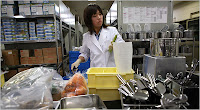NYT: Safe Food for Japan

Dear readers of my humble blog - as you may know, I have been working for consumer organizations for over a decade, and over the past 3-4 years, being based in Japan, there has been a lot to do as well.
I have visited Japanese ports where foods are being imported from all over the World, and found the inspectors to be very careful, dedicated, and professional. I have talked to the people who perform the testing and I have studied how samples are taken and analysed. As far as I am concerned, Japan gets A+ in terms of food safety. Much of that should be credited to the consumer activists, including the experts at Consumers Union of Japan, Japan Offspring Fund, Food Safety Citizens' Watch, Seikatsu Club (English) and other pressure groups and NGOs such as Yasai-Gurashi, Toziba and Tokyo Earth Day Market (Japanese).
So, I am truly delighted when the New York Times today notes that the United States has begun looking for food safety solutions in Japan:
The Japanese have developed tough approaches for ensuring the quality of Chinese imports, particularly food — in part by far more rigorous testing of its imported food than in the United States. But the innovation getting the most American attention is Japan’s system for screening Chinese producers even before they ship their merchandise to Japan.
A report released last week by the House Energy and Commerce Committee cited Japan’s system for monitoring spinach and other Chinese food exports as a possible model for importers in the United States. Last month, a White House working group issued its own report after visiting Tokyo, and even Chinese officials have urged the United States to adopt the Japanese approach.
Citing the US Food and Drug Administration, the report has described Japan’s model as the most realistic one for protecting American consumers: “The Japanese system of regulating Chinese food imports does appear to offer better control than that currently used by F.D.A.,”it concluded.I did not know that Japan inspects 15 times more of the food it imports from China than the US does.
Consumer activists in Japan should be very proud of their work, not only in areas such as pesticide residue or the opposition to food irradiation and genetically modified foods:
The program is the product of Japan’s longer experience with Chinese safety problems, going back to the discovery five years ago of high levels of pesticide in Chinese frozen spinach. Americans have become more conscious of such safety issues this year, with the highly publicized recalls of Chinese-made toys contaminated with lead paint and pet food ingredients containing hazardous chemicals.
“Japan is five years ahead of the rest of the world in dealing with quality problems from China,” said Tatsuya Kakita, the author of several books here on food safety. “The world can learn from Japan.”
New York Times: Safe Food for Japan
Dingell, Stupak Release Report on Safety of Food Imported from China; Announce Series of Hearings (Oct. 5, 2007)

Comments
I do have some concerns about food safety here. I'm glad they are inspecting imports carefully, but what about all the pesticide use here and reported dioxin levels in Japanese food? Since that's what I mainly eat, I'm wondering if there is any current information, and if they are doing anything about it?
On a positive note, one of my students (a retired professor) has started to grow organic vegetables of different kinds, and is experimenting with different varieties, and selling the extra produce in a shop in a near-by town. I think he is going about this intelligently and will hopefully influence others around here to follow suit, and maybe eat a bit better. :)
Pesticide use is a problem all over the world. I wash vegetables and fruits with a brush and if possible, buy organic.
Dioxin (and hormon disrupting substances, or environmental hormones, also known as endocrine disrupters) was a big issue 10-15 years ago. In most areas of Japan they have better garbage incinerators now, with high-tech filters that actually work. That's also why sorting the garbage is such a big deal here, to avoid burning stuff that might cause pollution.
Glad to hear about your student!
Glad to hear they are improving the garbage burning. I know the best thing we could do is not produce so much, though.
I'm especially interested in this area, so any future articles on education of people to use less plastic, food safety, reduction of pollution would be much appreciated by me!
:)